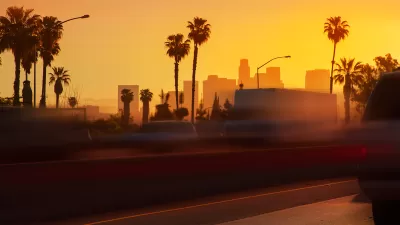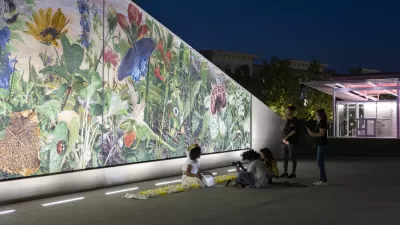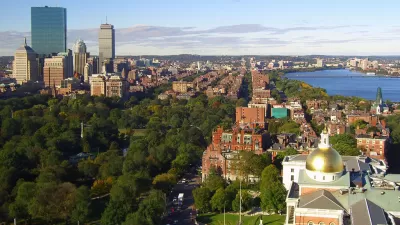A longread, written by Sam Boch and published by Places Journal, has been creating a stir online and is highly recommended for those with an interest in intersections between social justice and urban design.

"Shade is often understood as a luxury amenity, lending calm to courtyards and tree-lined boulevards, cooling and obscuring jewel boxes and glass cubes. But as deadly, hundred-degree heatwaves become commonplace, we have to learn to see shade as a civic resource that is shared by all," writes Sam Bloch.
Shade, according to Bloch, is an index of inequality.
The primary case study for this case is Los Angeles, where the inequality of shade plays out at bus shelters, on the sidewalks, and in the front yards of low-income and minority neighborhoods—enabled by city policies designed for more affluent, suburban neighborhoods and manifested by decades of traffic engineering that prioritizes the fast movement of single-occupant automobiles.
"A few years back, Los Angeles passed sweeping revisions to the general plan meant to encourage residents to walk, bike, and take more buses and trains. But as Angelenos step out of their cars, they are discovering that many streets offer little relief from the oppressive sunshine." What's needed more equally distribute shade, according to Bloch, is a better understanding of shade as a public resource, "a kind of infrastructure."
That understanding runs up against political groups that use shade in a weapon to obstruct new development. "They show up at planning meetings to protest tall buildings that would block views or darken sunbathing decks, and police urge residents in high-crime neighborhoods to cut down trees that hide drug dealing and prostitution. Shade trees are designed out of parks to discourage loitering and turf wars, and designed off streets where traffic engineers demand wide lanes and high visibility."
The article includes a lot of insights offered by experts on Southern California architecture and history, personal and hyper-local anecdotes from neighborhoods around Los Angeles, failed efforts to plant new tress, and the still-nascent progress of more welcoming ideas about shade and urban design influencing even the most high profile urban design projects, like for Pershing Square in Downtown Los Angeles.
One big takeaway from this thorough and exhaustive study bears repeating (and necessitates that planners and urban designers set aside the time to read and re-read this article): "So to the list of environmental injustices in this country, we can add the unequal distribution of shade."
FULL STORY: Shade

Montreal Mall to Become 6,000 Housing Units
Place Versailles will be transformed into a mixed-use complex over the next 25 years.

Planetizen Federal Action Tracker
A weekly monitor of how Trump’s orders and actions are impacting planners and planning in America.

DARTSpace Platform Streamlines Dallas TOD Application Process
The Dallas transit agency hopes a shorter permitting timeline will boost transit-oriented development around rail stations.

Study: 4% of Truckers Lack a Valid Commercial License
Over 56% of inspected trucks had other violations.

Chicago Judge Orders Thousands of Accessible Ped Signals
Only 3% of the city's crossing signals are currently accessible to blind pedestrians.

Philadelphia Swaps Car Lanes for Bikeways in Unanimous Vote
The project will transform one of the handful of streets responsible for 80% of the city’s major crashes.
Urban Design for Planners 1: Software Tools
This six-course series explores essential urban design concepts using open source software and equips planners with the tools they need to participate fully in the urban design process.
Planning for Universal Design
Learn the tools for implementing Universal Design in planning regulations.
City of Mt Shasta
City of Camden Redevelopment Agency
City of Astoria
Transportation Research & Education Center (TREC) at Portland State University
US High Speed Rail Association
City of Camden Redevelopment Agency
Municipality of Princeton (NJ)





























